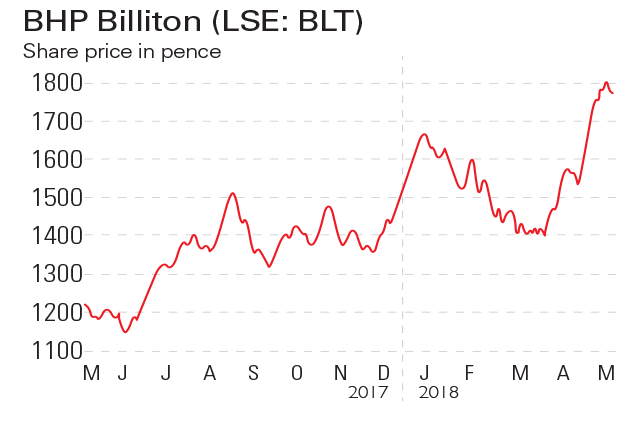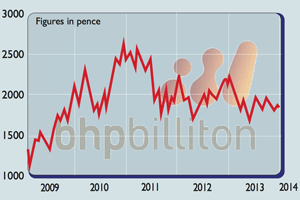BHP Billiton struggles with the diet
The mining giant navigated a commodities slide by shedding baggage. Is it in good enough shape for the uphill climb to come? Alice Gråhns reports.
Get the latest financial news, insights and expert analysis from our award-winning MoneyWeek team, to help you understand what really matters when it comes to your finances.
You are now subscribed
Your newsletter sign-up was successful
Want to add more newsletters?

Twice daily
MoneyWeek
Get the latest financial news, insights and expert analysis from our award-winning MoneyWeek team, to help you understand what really matters when it comes to your finances.

Four times a week
Look After My Bills
Sign up to our free money-saving newsletter, filled with the latest news and expert advice to help you find the best tips and deals for managing your bills. Start saving today!

"Going on a crash diet seems great while you're shedding the pounds," says David Fickling on Bloomberg. The hard bit is "sticking with it for the long term". This seems to be happening to the world's miners, which have spent the years since the commodity boom peaked in 2011 "holding down salaries, eking out efficiencies and extracting the highest-quality parts of their deposits" in order to adjust to deflating prices for raw materials.
But now it looks as though the cost discipline is slipping. At the world's largest miner, BHP Billiton, controllable costs rose by $1.24bn in the year through June, it reported this week. The sum eclipsed a $1.02bn gain to earnings before interest, tax, depreciation and amortisation (Ebitda) from higher volumes at the company's two biggest operations.
The rising costs bear watching, says Lex in the Financial Times, but the key issue this time round is a series of one-off charges in the second half of the year. These included the impairment of BHP's US onshore shale business, charges for a dam failure at an ore mine in Brazil and the impact of the US tax reform on its balance sheet. Adjusted for those, the miner managed to grow overall profits by a third on the previous year. As a result, BHP raised its annual dividend by 42% and confirmed it will return the bulk of almost $11bn in asset sales to investors.
MoneyWeek
Subscribe to MoneyWeek today and get your first six magazine issues absolutely FREE

Sign up to Money Morning
Don't miss the latest investment and personal finances news, market analysis, plus money-saving tips with our free twice-daily newsletter
Don't miss the latest investment and personal finances news, market analysis, plus money-saving tips with our free twice-daily newsletter
The outlook brightens
After a few turbulent recent years, BHP now "looks back on track", says Andrew Peaple in The Wall Street Journal. The company has slimmed down its portfolio: three major assets iron ore and coal in Australia and a giant copper mine in Chile last year contributed to three-quarters of its Ebitda. BHP also generated enough cash to reduce its net debt.
Having steadied the ship, the group should turn its attention to "pricklier strategic issues, including whether to stick with oil, gas and potash", says Clara Ferreira-Marques on Breakingviews. Conventional oil is the smallest and least profitable of its operating areas. Deciding what to do with its greenfield assets, Olympic Dam an Australian mine that has suffered production problems and Jansen, a potash initiative whose future is undecided, is a "thornier" problem.
But while it's mulling these issues over, it shouldn't ignore the bigger picture, as Peaple points out. The miner relies primarily on "a factor it can't control commodity prices". This year looks less encouraging on that front given China's slowdown and trade disputes, implying a drop in cash flow on top of rising costs. The big jump in BHP's shares this week along with its unusually wide premium to rival Rio Tinto suggest that the market "has baked in all the good news for now".
Farfetch float: the clue's in the name
After more than a year of speculation, London-based Farfetch this week said that it is planning an initial public offering (IPO) in New York, targeting a valuation of $5bn. "Its timing is noteworthy," says Andrea Felsted on Bloomberg. In 2017, the company, a digital hub for fashion boutiques, said that gross merchandise value the total amount of orders processed rose 55% to $909.8m. Meanwhile, pre-tax losses also increased from $83.1m to $112.1m as a result of heavy investment.
As a platform that doesn't manage its own stock, Farfetch "has scope to tap big network effects at modest cost and to grow fast", says Lex in the Financial Times. But the $5bn valuation "is itself farfetched". If it floated at $5.7bn, it would go for an "eye-watering" 15 times sales. "You would have to look at a platform as bulletproof as Rightmove, which dominates UK home sales advertising, for a multiple as high". And while Farfetch claims to be a tech play, it's really "Just Eat for fashionistas", says Robert Lea in The Times.
It offers a wide range of consumables to purchasers with various tastes, though at a higher price. Meanwhile, its decision to list shares in New York as opposed to London has "got City types in a tizzy". Farfetch says it chose the US as it's a more attractive investment environment for tech companies. What it means is that US investors "like to put a fancy price on an unproven lossmaker". But London "should be making a better fist of attracting stocks like Farfetch".
City talk
When Leo Quinn took the top job at construction group Balfour Beatty in 2015, he inherited 89 loss-making contracts, says Alistair Osborne in The Times. Most of them are now sorted and Balfour has just produced a 69% rise in half-year underlying operating profits to £66m. The figures were flattered by a £22m profit on selling part of Balfour's stake in the Connect Plus M25 operator, but two things stood out: average net cash of £161m, up from £45mlast time, and an 11% jump in the order book to £12.6bn. "Quinn is living up to his Build to Last' mantra."
Pepsi's outgoing CEO Indra Nooyi "is handing her successor [Ramon Laguarta] a fizzy leaving present", says Aimee Donnellan on Breakingviews. She's buying SodaStream, which sells sparkling water makers, for $3.2bn. Tapping into this market makes sense; carbonated water sales grew nearly 6% last year, compared with fizzy rivals' 3.7% rise during the same period.
Yet Pepsi is paying a 32% premium to SodaStream's average share price over the past month. And if Laguarta wants a return of around 10% by 2020, he will have to grow the top line by 15% a year. This is "not impossible but he will still have to provide more fizz than he might have liked".
"If bumbags can make a fashion comeback, why can't high-end British bag maker Mulberry?" asks Lex in the FT. The group has lost three-quarters of its market value in the past five years. This week, Mulberry's shares fell more than 25% as it warned that it would book a £3m hit from House of Fraser's problems.
Meanwhile, Mulberry's own sales are already falling; down 7% year-on-year in the ten weeks following March. Its mantra, "accessible luxury", is the problem; it leaves it positioned in the middle ground where it relies more on department stores than some other brands. "Until Mulberry can reduce this dependency, there is no reason to expect a revival."
Get the latest financial news, insights and expert analysis from our award-winning MoneyWeek team, to help you understand what really matters when it comes to your finances.
Alice grew up in Stockholm and studied at the University of the Arts London, where she gained a first-class BA in Journalism. She has written for several publications in Stockholm and London, and joined MoneyWeek in 2017.
Alice is now Consumer Editor at The Sun and covers everything from energy bills to Social Security.
-
 Should you buy an active ETF?
Should you buy an active ETF?ETFs are often mischaracterised as passive products, but they can be a convenient way to add active management to your portfolio
-
 Power up your pension before 5 April – easy ways to save before the tax year end
Power up your pension before 5 April – easy ways to save before the tax year endWith the end of the tax year looming, pension savers currently have a window to review and maximise what’s going into their retirement funds – we look at how
-
 No one cares about the oil market – that’s why it’s a good time to invest
No one cares about the oil market – that’s why it’s a good time to investFeatures The best time to invest in a market is when things are quiet. And right now, there’s no market quieter than oil. Dominic Frisby picks the best way to buy in.
-
 If you'd invested in: BHP Billiton and Medica Group
If you'd invested in: BHP Billiton and Medica GroupFeatures Mining giant BHP Billiton has seen its share price more than double since the beginning of 2016, while radiology services provider Medica has seen its own price plunge.
-
 BHP Billiton doubles down on its mining strategy
BHP Billiton doubles down on its mining strategyFeatures As commodities prices rise, the giant miner is ramping up production. Is that the right strategy, asks Alex Williams.
-
 Painful changes at the miners
Painful changes at the minersNews Mining company Anglo American scrapped its dividend after overtaking commodities giant Glencore as the worst-performing stock in the FTSE 100 this year.
-
 BHP Billiton hit by disaster in Brazil
BHP Billiton hit by disaster in BrazilNews Shares in BHP Billiton plunged after a collapse in a mine in Brazil left four dead and 22 missing.
-
Is the gloom overdone on mining stocks?
News As China-related panic spread this week, the mining sector slid. BHP Billiton, Anglo American and Glencore all fell by more than 7% on Monday.
-
BHP dismantles the empire
News Mining giant BHP Billiton is to spin off some assets into a separate company, allowing it to focus on its most profitable businesses.
-
 Shares in focus: Should you buy this mining behemoth?
Shares in focus: Should you buy this mining behemoth?Features Investors have rightly been nervous of miners. Is BHP Billiton different? Phil Oakley investigates.